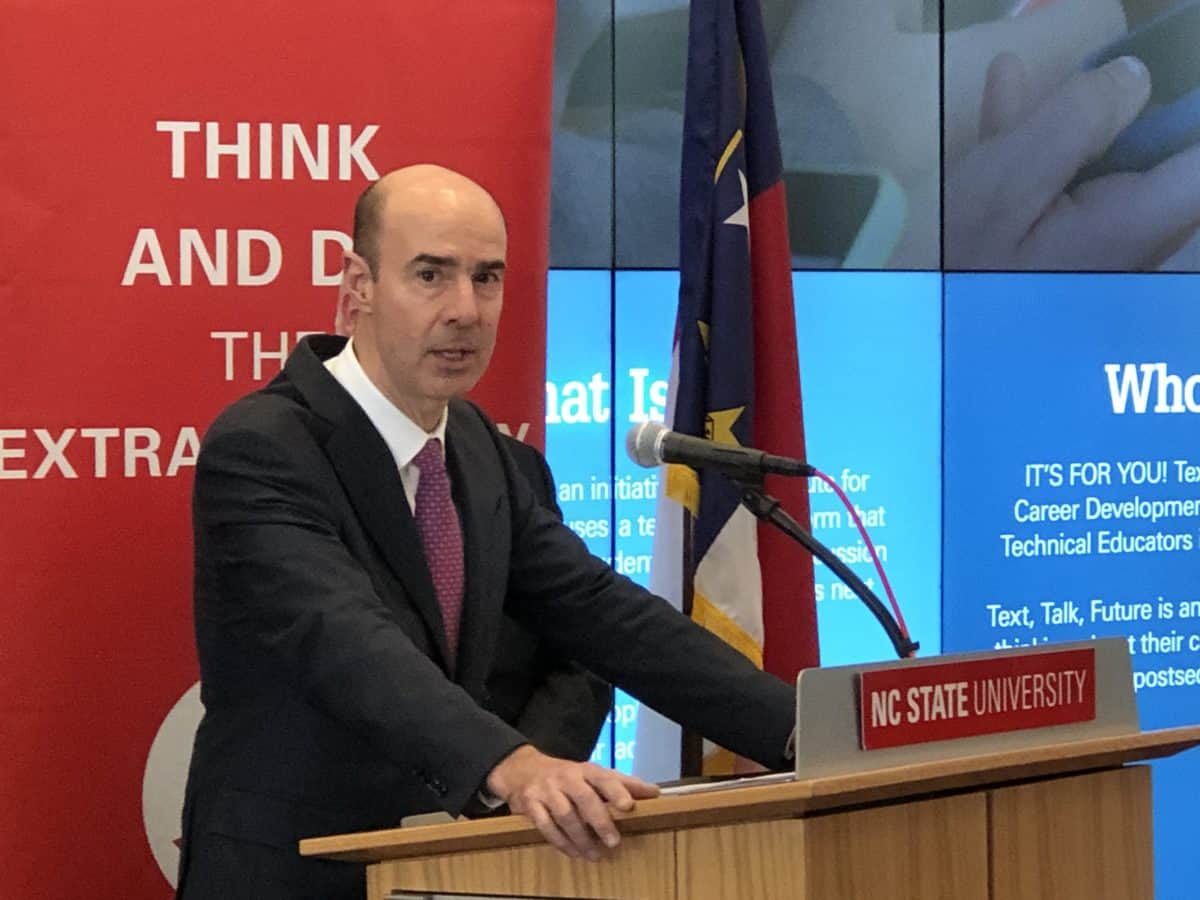
Before he arrived at the Hunt Library on Centennial Campus at NC State to announce an investment in apprenticeships, United States Secretary of Labor Eugene Scalia spent some time traveling around our state. As he visited companies and spoke to workers, business people, civic leaders, and educators, Scalia said he saw “signs of energy and growth.”
But over and over people asked him, “Where can we find more skilled workers?”
It isn’t a new question in North Carolina. myFutureNC is a statewide nonprofit focused on attainment, the result of a cross-sector collaboration between leaders in education, business, and government. The state’s attainment goal is 2 million by 2030 — that’s 2 million North Carolinians ages 25 to 44 with a high-quality credential or degree.
“The goal of myFutureNC,” said Cecilia Holden, the CEO and president of myFutureNC, “is centered around making sure North Carolinians have the talent necessary to meet the demands of business and industry.”
“This economy is great, but we need more talent,” echoes Scalia. “Scarcity of skilled workers can constrain productivity.”
The need is more pronounced in advanced manufacturing, cyber security, artificial intelligence, and healthcare, Scalia said, noting these are “expanding fields which often have very specific technical training — and call for training that doesn’t necessarily require a four-year college degree.”
The U.S. Department of Labor is investing $100 million in grants to 28 public-private partnership programs across the country to expand apprenticeships into industries that don’t have large scale apprenticeship programs — industries often looking outside the United States for skilled workers.
“Apprenticeships are one very important way to equip American workers with skills to help them succeed and meet the demands of the current job market,” said Scalia.
He continued, “Apprenticeships are paid positions that combine on-the-job training and mentorship with classroom instruction and which result in a credential that is recognized by other employers in the industry.”
Scalia identified three benefits to apprenticeships: 1) apprentices earn while they learn, 2) workers are trained in work that they know is needed now, and 3) apprenticeships lead to good jobs.
NC State received a four-year, $6 million closing the skills gap grant, which will fund the Artificial Intelligence Academy: NC Apprenticeships for Innovation. The grant will be matched with $2.7 million in private sector funds.
The apprenticeships will include classroom and on-the-job training for 21 AI occupations.
According to a press release, industry partners include IBM, CISCO, Citrix, Pentair, Hazardous Software, Diveplane, Randstad Technologies, Battelle Memorial Institute, and MCNC. Educational partners include N.C. Community Colleges/Apprenticeship NC, Purdue Global, MACUL, and Metriks Amerique. Veterans and other recruitment-related affiliated agencies involved in the project include FASTPORT, VetsinTech, Warrior Maven, Paradigm Shift, Monster Jobs, Dice, Industrial Internet Consortium, Crosby Communications, and Clearance Jobs. The NC Chamber will serve as a workforce development partner on the project.
The details:
- The AIA program will include two levels of training and associated certifications: Basic AI (artificial intelligence and data mining focus) and Advanced AI (machine learning and analytics focus).
- Apprentices will complete the entire program in one year.
- Industry partners will pay apprentices for at least part-time work during the program and will also pay apprentice tuition and fees for the AI credential program.
- Companies will benefit from additional workers in their organizations and will have the option to hire the apprentice upon completion of program.
Carla Johnson, senior faculty at NC State, is in charge of the project, which will be affiliated with the NC State College of Education’s Friday Institute for Educational Innovation.
“Our consortium will lead and inform the important work of building a pipeline of highly qualified and well prepared AI talent for North Carolina and beyond,” said Johnson.
Holden, the CEO of myFutureNC, said, “The Department of Labor’s announcement is an outstanding way to support 5,000 workers with training, college coursework, and certifications that will position North Carolina for the jobs of tomorrow. Work-based learning opportunities are a critical element in getting students exposure and experience as early as possible, while also allowing businesses to customize training to meet their specific job requirements. Investing early in the process pays off. Apprentices are proven to be more loyal employees, thus reducing the cost of hiring and training that comes with higher rates of attrition.”
Lt. Gov. Dan Forest, on hand for the announcement, said, “This is a great opportunity for our state, for NC State, the Friday Institute, and the College of Education.”


